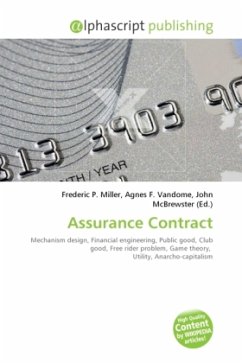An assurance contract, also known as a provision point mechanism, is a game theoretic mechanism and a financial technology that facilitates the voluntary creation of public goods and club goods in the face of the free rider problem. The free rider problem is that there may be actions that would benefit a large group of people, but once the action is taken, there is no way to exclude those who did not pay for the action from the benefits. This leads to a game theoretic problem: all members of a group might be better off if an action were taken, and the members of the group contributed to the cost of the action, but many members of the group may make the perfectly rational decision to let others pay for it, then reap the benefits for free, possibly with the result that no action is taken. The result of this rational game play is lower utility for everyone. Assurance contracts operate as follows: In a binding way, members of a group pledge to contribute to action A if a total contribution level is reached (often a monetary threshold, or a quorum of N members making the same pledge).
Bitte wählen Sie Ihr Anliegen aus.
Rechnungen
Retourenschein anfordern
Bestellstatus
Storno








